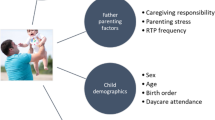Abstract
Until now studies comparing fathers and mothers have mostly been realized in dyadic situations, father-infant versus mother-infant. The aim of the present paper was to bring to the core similarities and differences, between fathers and mothers, in terms of performance (N=42 families) in a triadic context. Father, mother and baby, seated in a triangular formation were invited to play as usual: first, one parent played with the infant and the other was participant-observer, and then they reversed their roles.
Globally, no differences were observed between fathers and mothers in terms of being available, keeping their assigned roles, sharing a common focus of interest and co-creating games with their three month old infant. However a difference emerged when the order in which parents began as active parent versus third party parent was taken into account. Mothers who played first were better active partners than fathers, for keeping roles, sharing focus and co-creating games; and fathers who were first third party parent were better than third party mothers for sharing a common focus.
Résumé
Les études comparatives entre les pères et les mères ont, jusqu’à présent, été conduites dans des situations dyadiques (parent-enfant) et visaient généralement à établir les spécificités des uns et des autres. L’objectif de ce travail, sur 42 couples et leur premier-né âgé de 3 mois, est de mettre en évidence les similitudes et spécificités en termes de performance dans les interactions des pères et des mères dans la situation triadique du Lausanne Trilogue Play. Dans cette situation, chaque parent à tour de rôle interagit avec le bébé en présence de l’autre parent, qui est en position de participant-observateur; les trois partenaires étant installés en triangle.
Similar content being viewed by others
References
Braungart-Rieker, J.M., Garwook, M.M., Powers, B.P., & Wang, X. (1998). Parental Sensitivity, Infant Affect, and Affect Regulation: Predictors of Later Attachment,Child Development, 72(1), 252–270.
Conner, D.B., Knight, D., & Cross, D. (1997). Mothers’ and fathers’ scaffolding of their 2-year-olds during problem-solving and literacy interactions.British Journal of Developmental Psychology, 15, 323–338.
Dixon, S.D., Yogman, M.W., Tronick, E., Adamson, L., Als, H., & Brazelton, T.B. (1981). Early Infant Social Interaction with Parents and Strangers.Journal of the American Academy of Child Psychiatry, 20, 32–52.
Fivaz-Depeursinge, E., & Corboz-Warnery, A. (1999).The Primary Triangle. A Developmental Systems View. New-York: Basic Books Perseus, Harper/Collins.
Fivaz-Depeursinge, E., Frascarolo, F., & Corboz-Warnery, A. (1998). Evaluation de l’alliance triadique dans un jeu père-mère-bébé.Devenir, 10(4), 79–104.
Frascarolo, F. (1994).Engagement paternel quotidien et relations parents-enfant. Dissertation, University of Geneva, Switzerland.
Frascarolo, F. (in press). Paternal Involvement in Child Caregiving and Infant Sociability.Infant Mental Health Journal.
Harrison, M.J., Magill-Evans, J., & Benzies, K. (1999). Fathers’ scores on the Nursing Child Assessment Teaching Scale: Are they different from those of mothers?Journal of Pediatric Nursing, 14, 248–254.
Hinde, R.A., & Stevenson-Hinde, J. (Eds.). (1988).Relationships Within Families. Oxford: Oxford Science Publications.
Labrell, F. (1996). Paternal play with toddlers: Recreation and creation.European Journal of Psychology of Education, XI(1), 43–54.
Lamb, M.E. (1997a). Fathers and child development: An introductory overview and guide. In M.E. Lamb (Ed),The role of the father in child development (3rd ed., pp. 1–18). New-York: John Wiley & Sons.
Le Camus, J., Labrell, F., & Zaouche-Gaudron, C. (1997).Le rôle du père dans le développement du jeune enfant. Paris: Nathan.
Nugent, K.J. (1991). Cultural and psychological influences on the father’s role in infant development.Journal of Marriage and the Family, 53, 475–485.
McHale, J. (1995). Coparenting and triadic interactions during infancy — The roles of marital distress and child gender.Developmental psychology, 31(6), 985–996.
McHale, J., & Rasmussen, J. (1998). Coparental and family group-level dynamics during infancy: Early family precursors of child and family functioning during preschool.Development and Psychopathology, 10, 39–59.
McHale, J.P., Kuersten, R., & Lauretti, A. (1996). New directions in the study of family-level dynamics during infancy and early childhood. In J.P. McHale & P.A. Cowan (Eds.),Understanding how family-level dynamics affect children’s development: Studies of two-parent families (pp. 5–26). San Francisco: Jossey-Bass Publishers.
Parke, R. (1995). Fathers and families. In M.H. Bornstein (Ed.),Handbook of parenting: Status and social conditions of parenting (vol. 3, pp. 27–63). Mahwah, NJ: Erlbaum.
Pedersen, F.A., & Robson, K.S. (1969). Father participation in infancy.Amer. J. Orthopsychiat., 39 (3), 466–472.
Russel, A., & Russel, G. (1994). Coparenting early school-aged children: An examination of mother-father interdependence within families.Developmental Psychology, 30, 757–770.
Russel, G., & Russel, A. (1987). Mother-Child and Father-Child Relationships in Middle Childhood.Child Development, 58, 1573–1585.
Stern, D.N. (1974). Mother and Infant at Play: The Dyadic Interaction Involving Facial, Vocal, and Gaze Behaviors. In M. Lewis & L. Rosenblum (Eds.),The Origins of Behavior. I. The effect of the infant on its caregiver. New York: J. Wiley & Sons.
Stoneman, Z., & Brody, G.H. (1981). Two’s Company. Three Makes a Difference: An examination of Mothers’ and Fathers’ Speech to their Young Children.Child Development, 52, 705–707.
Tronick, E., Als, H., & Brazelton, T.B. (1979). Mutuality in mother-infant interaction.Journal of communication, 27(2): 74–79.
Yogman, M.W. (1981). Games Fathers and Mothers Play with their Infants.Infant Mental Health Journal, 2(4), 241–248.
Yogman, J.W. (1987). Father-infant caregiving and play with preterm and full-term infant. In P.W. Berman & F.A. Pedersen (Eds.),Men’s transition to parenthood: Longitudinal studies of early family experience (pp. 175–195). Hillsdale, NJ: Erlbaum.
Zaouche-Gaudron, C. (1997). La différenciation paternelle et le père suffisamment present.Neuropsychiatrie de l’enfance et de l’adolescence, 45(3), 153–161.
Author information
Authors and Affiliations
Additional information
The research presented in this article has been supported by the National Swiss Grant (grants 32-52508.97).
Rights and permissions
About this article
Cite this article
Frascarolo, F., Favez, N. & Fivaz-Depeursinge, E. Fathers’ and mothers’ performances in father-mother-baby games. Eur J Psychol Educ 18, 101–111 (2003). https://doi.org/10.1007/BF03173479
Received:
Revised:
Issue Date:
DOI: https://doi.org/10.1007/BF03173479




